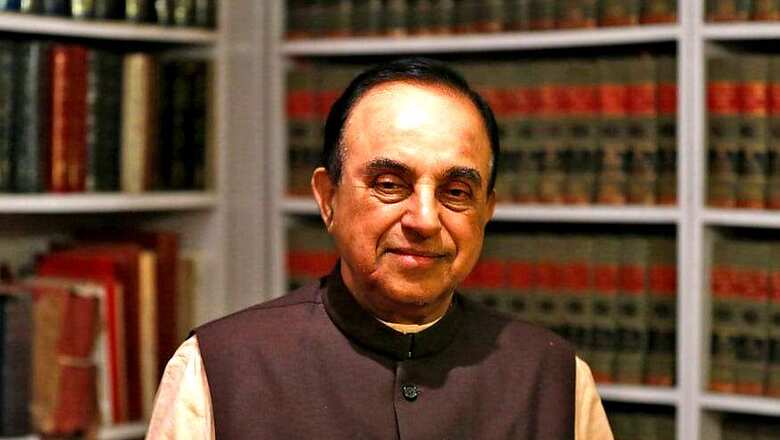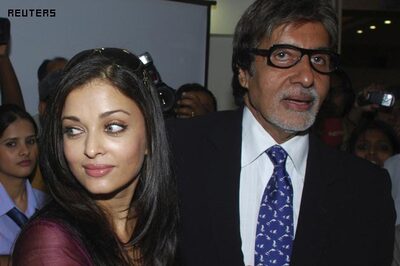
views
It's hotter these days inside Parliament than out there in the Delhi sun - Dr Subramanian Swamy is back in the highest law-making body of the country after a gap of 17 years.
He has returned to his favourite place in style. This time, nominated by the Bharatiya Janata Party to the Rajya Sabha. The ruling party finally rewarded him with an MP post for his untiring attack on its top political rivals, the Gandhis.
On his very first day, Swamy’s statement on Sonia Gandhi led to a huge furore, forcing the Deputy Chairman to adjourn the House and expunge the remark from the records.
Undeterred, Swamy attacked them again on Thursday. By now, there are enough indications that his blistering attack on the Gandhis will continue, come what may.
Known as India’s “Gadfly”, Swamy was one of the very few leaders who was not afraid of taking the name of Sonia Gandhi and her family during the UPA rule between 2004 to 2014. He also took on her son-in-law Robert Vadra, calling him a land grabber.
The BJP denied him a Lok Sabha ticket from New Delhi in 2014. Expectedly, Swamy was upset. But, he did not make his disenchantment with the BJP public. He maintained his close relationship with the RSS top brass and relentlessly pursued the National Herald case. He proudly claims that he made Sonia Gandhi and her son Rahul Gandhi appear before a court and take bail.
A Delhi-born Tamil Iyer, Subramanian Swamy has always been a controversial figure in Indian politics. After completing his PhD from Harvard University at the age of just 24, he returned to India to take up a teaching job at IIT Delhi in the late 1960s. His activist nature cost him his IIT job. He fought and won that case in the 1990s, returned to IIT and resigned on the same day. He is still fighting a case with the IIT over his dues. In the 1970s, he was made a Rajya Sabha member by the Jana Sangh, the previous avatar of the BJP.
A bitter critic of Indira Gandhi, he escaped from India during the Emergency Days in the second half of 1970s. His daring return to Rajya Sabha to demand “obituary” of democracy is the stuff of legends. He slipped through security again after that disguising himself as a Sikh taxi driver.
Later, Swamy became a supporter of Indira Gandhi in the 1980s. He claims he met the then Chinese President Deng Xiaoping to normalise Sino-India ties which had soured after the 1962 India–China war. Swamy was also a close friend of young prime minister Rajiv Gandhi and reportedly advised him on various issues. In the late 1990s, when the VP Singh-led BJP-backed government collapsed, Swamy played a key role in installing Chandrashekhar as the next Prime Minister after securing support from Rajiv Gandhi. Swamy was rewarded with the key Law and Commerce portfolio in that government.
He also had a good rapport with Prime Minister PV Narasimha Rao and was heading a Commission under him. Swamy, who had filed corruption cases against Tamil Nadu chief minister J Jayalalithaa after she lost power in 1996, surprised everyone by forging an alliance with her in 1998. He won the Lok Sabha election from Madurai with her help.
Angry over not being made a minister at the Centre, he organised the famous tea party between the newly elected Congress president Sonia Gandhi and Jayalalithaa. It led to the collapse of AB Vajpayee led NDA by just one vote in 1999.
After that Swamy once again turned against both Sonia and Jaya ending his friendship with them both.
In an exhaustive profile of Swamy for “Caravan” magazine Samanth Subramanian wrote: “Swamy’s political career is rife with contradictions. Some of his admirers have been drawn to his championing of economic liberalisation, but they have also been dismayed by his stated allegiance to the Hindu right and his views on Muslims; most infamously, in a bizarre op-ed in DNA last summer, Swamy suggested that India’s Muslims not be permitted to vote unless they acknowledge their Hindu ancestry.
He possesses a reputation as an intellectual—as an early and credentialled advocate of economic liberalisation, and even as the draughtsman of the blueprint for Manmohan Singh’s economic reforms in 1991. But this reputation has had to coexist with his fondness for airing theories that even his friends call kooky, and with the habits of a hectoring public persona”
Samanth Subramanian added: "Swamy has repeatedly found allies in people whom he has previously attacked without relent — common enough in politics, but surprising for somebody often called inflexible and uncompromising. He is intelligent and incorruptible — descriptions almost reflexively assigned to him even by his most bitter critics — and yet, in a country that yearns constantly for intelligent and incorruptible politicians, Swamy has only ever been the man outside the window, thumping loudly on the glass and hollering to be let in."
Now that he is back, everyday fireworks are likely to be a norm in Parliament in the next six years.




















Comments
0 comment